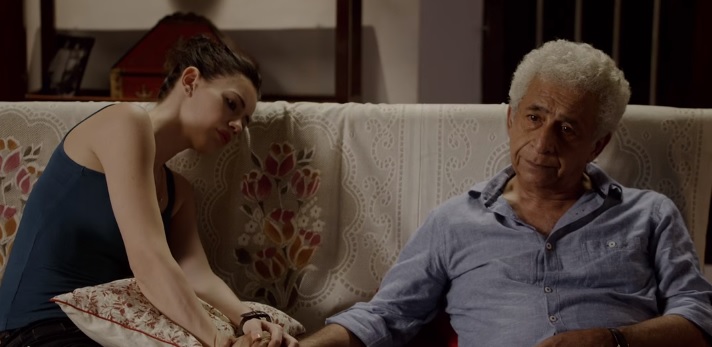Waiting is about many things – life and in its inevitability, generational differences, loss, coping, acceptance. As a film, it manages to speak about all of this and more. It triumphs because it follows the basis tenet: if you can show, don’t tell.
When your foundations are strong, little can go wrong. The story of Waiting is an inherently balanced one. A young girl waits for her newly married husband to recover from coma after an accident. An old man is waiting for his wife of 40 years to recover from coma after she collapsed 8 months ago. She resists the idea of operating him for fear of the quality of life he will have, though his chances of surviving are good. He pushes for an operation for her to recover at any cost, though she has no chances of surviving.
Waiting is a film structurally sound in plot and subtle yet insightful in its telling. Naseeruddin Shah plays Shiv, the older man waiting for his wife to wake up. The film starts with him being a source of strength and guidance to Kalki Koechlin, who plays Tara, the young girl who’s husband has just gone into coma. At one point, she asks him how he can be so Zen about the situation, and he calmly explains the stages of grieving and how to get there.
As the story unfolds, the writers pass the Zen baton from Shiv to Tara. She learns to cope with her situation, accepting the difficult journey ahead and the decisions that will come with it it. Shiv’s immense patience and faith is tested, as his acceptance is revealed to really be a denial of what the facts are about his wife’s survival chances.
The film is about symmetry, using the two characters and their storylines as a see-saw, balancing and adjusting every scene to drive the plot forward. The central pivot is often the doctor they share, played by Rajat Kapoor. He opposes Shiv’s persistent appeals to operate on his wife, believing that medically it is of no use. He opposes Tara’s reluctance to save her husband, believing that medically his chances are strong to survive.
Matching the dignity and grace of the writing are the performances by the lead pair. Naseeruddin Shah is pragmatic, devout, but human, and is able to bring all of this to his role. This is not a film where the actors have a finale, a scene or an opportunity where they get a chance to explode. It is a contained film, a little like a pressure cooker. They can simmer, and are allowed an occasional whistle, but nothing more. It’s this kind of restrain that would challenge an actor of his caliber, and he makes the most of it. He goes from being a man who does not know Twitter and cannot say “shit” convincingly, to blithely using the f-word in a conversation. The cuss words are the marker points of his graph, and it’s wonderful to watch him chart this journey.
Kalki is very good in her part. Her role demands a more upfront performance – she is allowed to shed tears openly, become upset, rage, and question everything. She is a young girl after all, and newly married to the love of her life. As with the rest of the film, this balances Naseer’s character perfectly.
Waiting is about many things – life and in its inevitability, generational differences, loss, coping, acceptance. As a film, it manages to speak about all of this and more. It triumphs because it follows the basis tenet: if you can show, don’t tell.
Hindi, Drama, Color


